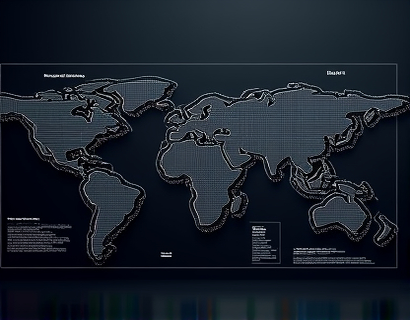Decentralized Corporation Software: Empowering Businesses with Secure, Efficient, and Transparent Registration Solutions
The advent of decentralized technology has brought about a paradigm shift in various sectors, and business registration is no exception. Traditional corporate registration processes are often marred by inefficiencies, lack of transparency, and security concerns. This article delves into the transformative potential of decentralized corporation software, designed to streamline business registration, ensure compliance, and enhance security and accessibility. By leveraging blockchain and decentralized technologies, this innovative software marks a significant step forward in corporate management in the digital age.
Decentralized registered corporations software is engineered to address the pain points associated with conventional registration methods. The primary goal is to create a more democratic, transparent, and efficient system for forming and managing corporations. This shift is particularly relevant for entrepreneurs and business owners who seek decentralized solutions that align with the principles of transparency and security.
Streamlining the Registration Process
The registration process for a corporation traditionally involves multiple steps, each prone to delays and human errors. From filing documents with regulatory bodies to obtaining necessary licenses and permits, the journey can be cumbersome and time-consuming. Decentralized corporation software simplifies this process by automating many of these steps. Utilizing smart contracts, the software ensures that all required documentation is submitted accurately and in a timely manner.
Smart contracts are self-executing contracts with the terms of the agreement directly written into code. They automatically verify and enforce the conditions set for registration, reducing the need for intermediaries and minimizing the risk of errors. This not only speeds up the registration process but also makes it more reliable and cost-effective.
Ensuring Compliance
Compliance with regulatory requirements is a critical aspect of corporate management. Traditional systems often struggle to keep up with the dynamic nature of regulations, leading to potential non-compliance and associated penalties. Decentralized corporation software addresses this challenge by integrating real-time updates on regulatory changes and ensuring that all necessary compliance checks are performed automatically.
The blockchain's immutable ledger provides a transparent and auditable record of all registration and compliance activities. This transparency helps in building trust among stakeholders and ensures that the corporation adheres to all legal requirements. Moreover, the decentralized nature of the system means that data is not stored in a single point of failure, reducing the risk of data breaches and unauthorized access.
Enhancing Security
Security is a paramount concern in any corporate operation, and the registration process is no different. Decentralized corporation software employs advanced cryptographic techniques to secure sensitive data. Each transaction, from the initial registration to ongoing compliance checks, is encrypted and stored on a distributed network, making it extremely difficult for malicious actors to tamper with the data.
Additionally, the use of decentralized identity verification methods ensures that only authorized individuals can access and modify corporate data. This multi-layered security approach not only protects the corporation's information but also reassures stakeholders of the integrity of the registration process.
Improving Accessibility
Accessibility is another key benefit of decentralized corporation software. Traditional registration processes often require physical presence and can be geographically restrictive. Decentralized platforms remove these barriers by allowing entrepreneurs to register and manage their corporations from anywhere in the world, as long as they have an internet connection.
The user interface is designed to be intuitive and user-friendly, making it accessible to individuals with varying levels of technical expertise. This democratization of corporate registration empowers a broader range of individuals to start and manage their own businesses, fostering innovation and economic growth.
Case Studies and Real-World Applications
Several organizations have already begun to leverage decentralized corporation software to revolutionize their operations. For instance, a group of independent creators formed a decentralized cooperative to manage their collective intellectual property. By using the software, they were able to register their cooperative quickly and ensure that all membership contributions and decisions were recorded transparently and securely.
Another example is a startup that utilized the platform to streamline its onboarding process for new employees. The decentralized system allowed for instant verification of credentials and compliance with labor laws, significantly reducing the administrative burden on the HR department. This not only improved efficiency but also enhanced the overall employee experience.
Challenges and Future Prospects
While the potential of decentralized corporation software is vast, there are several challenges that need to be addressed for widespread adoption. One of the primary challenges is regulatory uncertainty. As decentralized technologies are still relatively new, many jurisdictions are yet to establish clear guidelines for their use in corporate registration.
Another challenge is the need for greater user education. Many entrepreneurs and business owners are unfamiliar with blockchain and decentralized technologies, which can hinder adoption. However, as awareness grows and more success stories emerge, these barriers are likely to diminish.
Looking ahead, the integration of decentralized corporation software with other emerging technologies such as artificial intelligence and the Internet of Things (IoT) holds immense promise. AI can further enhance the automation of compliance checks and risk assessments, while IoT can provide real-time data for more informed decision-making.
Conclusion
Decentralized corporation software represents a significant leap forward in the way businesses are registered and managed. By streamlining processes, ensuring compliance, enhancing security, and improving accessibility, this innovative solution is poised to transform corporate management in the digital age. As more organizations recognize the benefits of decentralized technologies, we can expect to see a growing adoption of these platforms, paving the way for a more transparent, efficient, and secure business ecosystem.









































